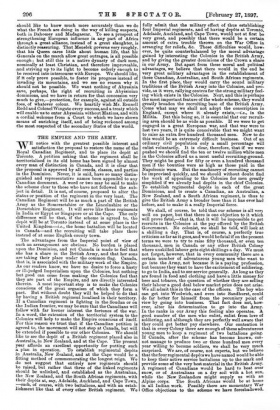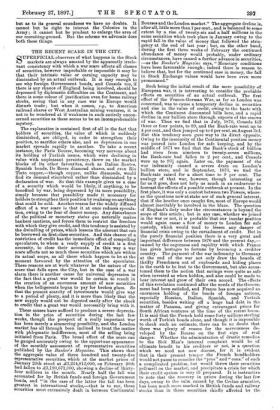THE EMPIRE AND THE ARMY.
WE notice with the greatest possible interest and satisfaction the proposal to restore the name of the Royal Canadian Regiment, and to place its depot at Toronto. A petition asking that the regiment shall be territorialised in its old home has been signed by almost every man of distinction in Canada, and it is clear that the proposal is approved by all creeds, classes, and parties in the Dominion. Never, it is said, have so many distin- guished and representative names been appended to any Canadian document. A word or two may be said to make the scheme clear to those who have not followed the sub- ject in detail. It is not, of course, proposed to alter the status or position of the regiment in the very least. The Canadian Regiment will be as much a part of the British Army as the Somersetshire or the Lincolnshire or the Dorsetshire Regiment. It will serve like those regiments in India or Egypt or Singapore or at the Cape. The only difference will be that, if the scheme is agreed to, the depot will be at Toronto instead of at some place in the -United Kingdom—i.e., the home battalion will be located in Canada—and the recruiting will take place there instead of at some English county town.
The advantages from the Imperial point of view of such an arrangement are obvious. No burden is placed upon the Dominion, and yet Canada is made to feel that she has a share in the British Army, and that her sons are taking their place under the common flag. Canada, that is, is associated with the military work of the Empire. As our readers know, we have no desire to force a hasty or ill-judged Imperialism upon the Colonies, but nothing but good can come from making the Colonies feel that they are part of the Empire, and are directly interested therein. A most important step is to make the Colonies conscious of the great organism of which they form a part. But without doubt they will be helped to do that by having a British regiment localised in their territory. If a Canadian regiment is fighting in the Soudan or on the Indian frontier, we may be sure that the Canadians will follow with far keener interest the fortunes of the war. In a word, the extension of the territorial system to the Colonies will help to make the Empire conscious of itself. For this reason we trust that if the Canadian petition is agreed to, the movement will not stop at Canada, but will be extended if possible to our other Colonies. We should like to see the depOt of a British regiment placed also in Australia, in New Zealand, and at the Cape. The present year affords an excellent opportunity for putting such a, plan in operation. To establish regimental depots in Australia, New Zealand, and at the Cape would be a fitting method of commemorating the longest reign. We do not suggest that entirely new regiments should be raised, but rather that three of the linked regiments should be unlinked, and established as the Australian, the New Zealand, and the South African regiments, with their deptits at, say, Adelaide, Auckland, and Cape Town, —each, of course, with two battalions, and with an estab- lishment like that of every other British regiment. We fully admit that the military effect of thus establishing four Imperial regiments, and of having depots at Toronto, Adelaide, Auckland, and Cape Town, would not at first be very great, and possibly that there would be a certain amount of extra trouble thrown on the War Office in arranging for reliefs, &c. These difficulties would, how- ever, be quite counterbalanced by the moral advantage gained by interesting the Colonies in the British Army, and by giving the greater dominions of the Crown a share in our Army. But apart from these moral and political advantages, we believe that there would in the end be very great military advantages in the establishment of these Canadian, Australian, and South African regiments. In the first place, they would carry the sound military traditions of the British Army into the Colonies, and pro- vide, as it were, rallying centres for the strong military feel- ing which exists in the Colonies. Next, and this is perhaps the most important feature of the whole scheme, they would greatly broaden the recruiting base of the British Army. Come what may we shall not adopt the conscription in England, except where it already exists,—i.e., in the Militia. But this being so, it is essential that our recruit- ing area should be as wide as possible. If we were to get engaged in a great European war, and that war were to last two years, it is quite conceivable that we might want to raise an extra five hundred thousand men. Now to do this would be an extremely difficult business. Out of an ordinary civil population only a small percentage will enlist voluntarily. It is clear, therefore, that if we were pushed we should find the ten or twelve million white men in the Colonies afford us a most useful recruiting-ground. They might be good for fifty or even a hundred thousand men if the bounties were as high as those paid in the Napoleonic wars. But the machinery of recruiting cannot be improvised quickly, and we should without doubt find the work of appealing to the Colonies for men greatly simplified if we already had deptits in the chief Colonies. To establish regimental depots in each of the great Dominions, and to create a Canadian, an Australian, a New Zealand, and a South African regiment, is thus to give the British Army a broader base than it has ever had before, and to make it a really Imperial force.
We shall, of course, be told that our scheme is all ver3 well on paper, but that there is one objection to it which will prove fatal,—that is, that it will be impossible to get recruits in the Colonies at the pay offered by the British Government. No colonist, we shall be told, will look at a shilling a day. That is, of course, a perfectly true criticism as far as it goes,and would be fatal if on the present terms we were to try to raise fifty thousand, or even ten thousand, men in Canada or any other British Colony where unskilled labour gets eight shillings a day. We must not forget, however, that in every community there are a certain number of adventurous young men who want to go into the Army, not because it is a paying profession, but because they want to have the excitement of soldiering, to go to India, and to see service generally. As long as they are found in food and clothing and have a little money for beer and tobacco, the question of whether they are selling their labour a good deal below market price does not arise. We all admit this in the case of the officers. The boy who can get into Woolwich, and even into Sandhurst, could do far better for himself from the pecuniary point of view by going into business. That fact does not, how- ever, alter his determination to go into the Army. In the ranks in our Army this feeling also operates. A good number of the men who enlist, enlist from love of soldiering, and although they are perfectly well aware that they could get better pay elsewhere. Our contention is that in every Colony there are enough of these adventurous young men to keep a regiment of two battalions going. If Canada, after the scheme has become known, can- not manage to produce two or three hundred men every year willing to become soldiers, we shall be very much surprised. We are, of course, not experts, but we believe that the fourregimental depots we have named would be able to keep their active service battalions up to the mark and provide some of the very best material in the British Army. A regiment of Canadians would be hard to beat over snow, or of Australians on a dry soil with a hot sun, while the New Zealanders might supply us with an Alpine corps. The South Africans would be at home in all Indian work. Possibly there are momentary War Office objections to the scheme we have foreshadowed. but as to its general soundness we have no doubts. It cannot but be right to interest the Colonies in the Army; it cannot but be prudent to enlarge the area of our recruiting-ground. But the scheme we advocate does both these things.



































 Previous page
Previous page